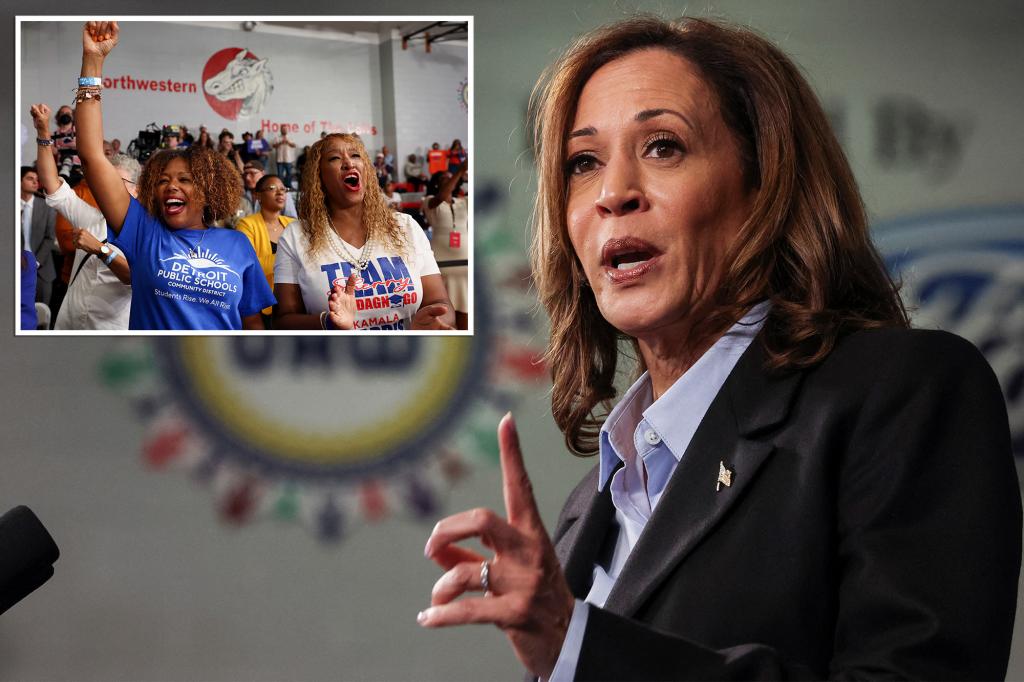Small businesses, big price tag.
Vice President Kamala Harris will announce Wednesday that she plans to increase the amount in tax deductions offered for startups by tenfold if elected president — a policy experts say could cost Americans as much as $20 billion over the next decade.
The Harris plan, expected to be unveiled during a campaign stop in New Hampshire, would up the current $5,000 tax deduction for small businesses and their startup expenses to $50,000.
“This proposal would also allow new businesses to wait to claim that deduction until they first turn a profit in order to reduce their taxes,” a Harris campaign official said Tuesday.
Garrett Watson, a senior policy analyst at the nonpartisan Tax Foundation, told The Post that the plan would cost approximately $20 billion over the next 10 years.
The assessment was based in part on a provision from a 2010 federal law, the Small Business Job Creation Act, which upped the deduction of business expenditures for startups from $5,000 to $10,000, amounting to a total cost of $230 million over a decade.
However, the increased deduction sunset after one year and was not extended.
“Generally speaking, it’s better to allow startups the space to properly deduct costs from their revenue, including against future revenue, rather than disallowing deductions for expenses or requiring lengthy amortization of those costs,” Watson said.
Marc Goldwein, a senior policy director for the nonpartisan Committee for a Responsible Federal Budget (CRFB), affirmed the $20 billion ballpark cost.
“Most of what this policy is doing is changing the timing of taxes,” Goldwein explained. “Normally it’s a benefit to deduct it faster, but startup costs are sometimes different.”
The plan would benefit some business, Goldwein noted, but “as a practical matter, a lot of businesses are not going to be able to deduct that much in the first year.”
“I’m glad to see Harris acknowledge that cutting taxes helps businesses,” added Adam Michel, the director of the libertarian Cato Institute’s tax policy studies. “The opposite is also true: raising taxes hurts businesses, big and small.”
“Instead of limiting the deductibility of small business start-up expenses to just $50,000, a better policy would be to allow all businesses to deduct all of their expenses in the year they are made,” Michel offered. “This, often called full expensing, is one of the most pro-growth tax reforms, and was a centerpiece of former President Trump’s 2017 tax cuts.
“Unfortunately, the Harris proposal excludes most business investments,” Michel added. “By choosing to focus on a narrow segment of American employers, her proposals will make it harder for every other business in America to start up or expand their operations.”
Michael also warned that the Democratic nominee’s economic policy would hurt, not help, American business.
“As a whole, the Harris tax plan will raise taxes on small and family businesses by letting top individual tax rates return to 39.6%,” he said, “and will increase other business and investment taxes to some of the highest tax rates in the developed world.”
“If Harris actually wanted to help American businesses grow, she should focus on allowing all businesses to deduct the costs of their investments and cut their tax rates rather than raising them,” Michel also said.
The veep previously vowed to push for a corporate tax rate of 28%, up from the current rate of 21%.
Harris, 59, also hopes to receive 25 million new business applications in her first term as president, the campaign official said.
“There is no shortage of new business applications today, so it’s unclear why Harris would make that a priority,” said EJ Antoni, a public-finance economist at the Heritage Foundation. “Instead, the problem today is that most businesses can’t get started or fail shortly after starting due to high costs from inflation and regulatory burdens.”
Antoni called the Harris proposal “a classic case of the left hand not knowing what the right hand is doing.”
“Harris wants to impose an unrealized gains tax, higher income taxes, and higher taxes on investment. If she wanted to reduce taxes on small businesses, she wouldn’t be pushing for more taxes instead,” he said.
The small business agenda is one of the few detailed policy items that Harris has offered since taking over Democratic standard from President Biden, and comes off the heels of her other economic policy proposal that included a ban on purported price gouging of groceries, an increase in the Child Tax Credit and offering new homeowners $25,000 for a down payment — all policies that experts warned would increase inflation.




